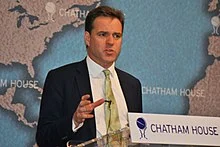Who is Niall Ferguson? If you have ever found yourself wondering about the man behind some of the most influential works of history in the 21st century, you’ve come to the right place. This article will provide a comprehensive overview of Niall Ferguson’s life, career, and contributions to the field of history. As an esteemed historian, author, and public intellectual, Ferguson has shaped our understanding of modern history in profound ways.

Early Life and Education
Born on April 18, 1964, in Glasgow, Scotland, Niall Ferguson hails from a family of educators. His father, James Ferguson, was a doctor, while his mother, Molly Hamilton, was a physics teacher. Growing up in a stimulating environment, it is no surprise that Niall Ferguson developed a keen interest in history and academia.
Ferguson attended The Glasgow Academy, an independent school in Scotland, before moving on to Magdalen College, Oxford. At Oxford, he earned his Bachelor of Arts, Master of Arts, and Doctor of Philosophy degrees in History. It was here that Ferguson began to establish himself as a formidable historian and academic, mentored by the likes of A.J.P. Taylor and Norman Stone.
Career and Notable Works
Niall Ferguson has had an illustrious career as a historian, writer, and educator. He has taught at prestigious universities, such as New York University, Harvard University, and Stanford University. Ferguson has also held research positions at institutions like the London School of Economics and the Hoover Institution.
Throughout his career, Niall Ferguson has authored numerous groundbreaking books that have garnered both critical acclaim and commercial success. Some of his most notable works include:
The Pity of War (1998) – In this seminal book, Ferguson offers a fresh perspective on the causes and consequences of World War I. He challenges conventional wisdom, arguing that the war was neither inevitable nor an accident, but rather the result of flawed decision-making by European leaders.
The Cash Nexus (2001) – This book examines the relationship between money, power, and politics in modern history. Ferguson posits that financial factors have played a crucial role in shaping global events, from the rise of nation-states to the present day.
Empire: How Britain Made the Modern World (2003) – In this controversial work, Ferguson explores the impact of the British Empire on world history. He argues that, despite its flaws, the Empire was instrumental in spreading liberal values, free trade, and economic development across the globe.
The Ascent of Money (2008) – This best-selling book traces the evolution of money and financial systems throughout history. Ferguson demonstrates how economic factors have shaped human progress and offers insights into the current global financial crisis.
Civilization: The West and the Rest (2011) – In this ambitious work, Ferguson identifies six “killer applications” that have propelled Western civilization to global dominance. He assesses the future of the West in light of emerging powers like China and India.
Public Intellectual and Media Presence
In addition to his academic pursuits, Niall Ferguson has emerged as a prominent public intellectual, often contributing to debates on current affairs and international relations. He has written for major publications like The New York Times, The Wall Street Journal, and The Guardian, and has appeared on television programs such as BBC Newsnight and Charlie Rose.
Ferguson’s work has also been adapted for television, most notably in the documentary series The Ascent of Money and Civilization: The West and the Rest, which he presented and narrated.
Critiques and Controversies
Niall Ferguson’s work has attracted both praise and criticism from various quarters. His provocative arguments and willingness to challenge conventional wisdom have made him a polarizing figure in the world of history and academia.
Some critics argue that Ferguson’s views on the British Empire are revisionist and overly positive, downplaying the negative aspects of imperialism. Others have taken issue with his support for free-market capitalism and neoliberal policies, suggesting that he overlooks the role of government in promoting social welfare and economic stability.
Despite these criticisms, Niall Ferguson has remained steadfast in his convictions and continues to engage in intellectual debates with his detractors. His ability to spark conversations and challenge the status quo has cemented his reputation as one of the most influential historians of our time.
Personal Life
In addition to his professional accomplishments, Niall Ferguson has had an interesting personal life. He has been married twice, first to journalist Susan Douglas, with whom he has three children, and later to Ayaan Hirsi Ali, a Somali-born Dutch-American activist, author, and former politician. His marriage to Hirsi Ali has further enhanced his public profile, as both are known for their outspoken views on a variety of social and political issues.
Conclusion
So, who is Niall Ferguson? He is a distinguished historian, author, and public intellectual who has made significant contributions to our understanding of modern history. With an impressive academic career, thought-provoking books, and a strong media presence, Ferguson has become an influential figure in the global intellectual landscape.
While his work has attracted its fair share of controversy, there is no denying the impact Niall Ferguson has had on the study of history and public discourse. As we continue to grapple with the complexities of the modern world, his insights and perspectives will undoubtedly remain relevant and thought-provoking for years to come.
